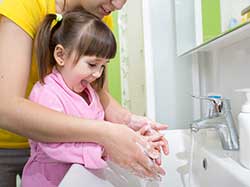Handwashing: A Powerful Antidote To Illness
 How many times have you and your child washed your hands today?
How many times have you and your child washed your hands today?
You might not have given it much thought. It’s either part of your routine, done frequently without thinking, or maybe you don’t do it much at all. But as your pediatrician may have told you, hand washing may be the single most important act you and your child have for disease prevention.
Making It Habit
As early as possible, get your child into the habit of washing her hands often and thoroughly. All day long, your child is exposed to bacteria and viruses—when touching a playmate, sharing toys, or petting the cat. Once her hands pick up these germs, she can quickly infect herself by:
- Rubbing her eyes
- Touching her nose
- Placing her fingers in her mouth.
The whole process can happen in seconds, and cause an infection that can last for days, weeks, or even longer.
When To Wash
Hand washing can stop the spread of infection. The key is to encourage your child to wash her hands throughout the day. For example, help her or remind her to wash her hands:
- Before eating (including snacks)
- After a trip to the bathroom
- Whenever she comes in from playing outdoors
- After touching an animal like a family pet
- After sneezing or coughing if she covers her mouth
- When someone in the household is ill
Studies on hand washing in public restrooms show that most people don’t have very good hygiene habits. “Hand washing” may mean just a quick splash of water and perhaps a squirt of soap, but not nearly enough to get their hands clean.
Steps to Proper Hand Washing
So what does a thorough hand washing involve? The Centers for Disease Control and Prevention (CDC) recommends the following steps:
- Wet your child’s hands.
- Apply clean bar soap or liquid soap to the hands, and then place the bar on a rack where it can drain before the next hand washing.
- Rub the hands vigorously together. Scrub every surface completely.
- Keep rubbing and scrubbing for 10 to 15 seconds to effectively remove the germs.
- Rinse the hands completely, then dry them.
How Long to Wash
Keep in mind that although 10 to 15 seconds of hand washing sounds like an instant, it is much longer than you think. Time yourself the next time you wash your hands. Watch your child while she’s washing her hands to make sure she’s developing good hygiene behaviors. Pick a song that lasts for 15 seconds and sing it while you wash. Encourage your child to wash her hands not only at home, but also at school, at friends’ homes, and everywhere else. It’s an important habit for her to get into, and hopefully one that’s hard to break!
Article Source(s):
Immunizations & Infectious Diseases: An Informed Parent’s Guide (Copyright © 2006 American Academy of Pediatrics)
https://www.healthychildren.org/English/health-issues/conditions/prevention/Pages/Hand-Washing-A-Powerful-Antidote-to-Illness.aspx
The information contained on this Web site should not be used as a substitute for the medical care and advice of your pediatrician. There may be variations in treatment that your pediatrician may recommend based on individual facts and circumstances.





